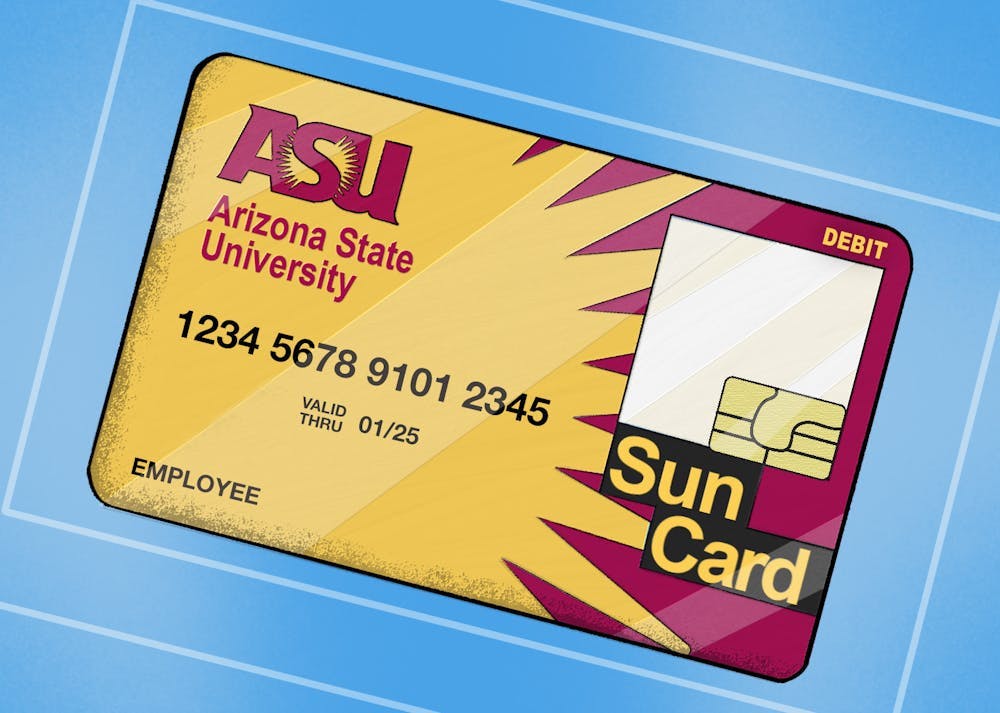How many young adults find or establish their first credit card on a college campus? Partnerships between universities such as ASU and financial institutions may not span beyond the thought of a logo on a team jersey or the naming of a sports stadium, but a more nuanced effect on students can be found in the details of these partnerships.
In 2012, ASU entered into a strategic alliance partnership with MidFirst Bank, which provided banking services for students. A major component of this partnership was the Pitchfork ID MasterCard Check Card, an identification card for university purposes that doubles as a bank card. ASU President Michael Crow endorsed this partnership as "a tremendous opportunity for ASU community members" when it was announced.
Over time, students began noticing the negative side effects of the Pitchfork ID MasterCard through faulty card declines, poor customer service and unsubstantiated fees.
Johanna Jorgenson, a graduate student studying social work, explains her own troubles with the quick-wearing Pitchfork ID MasterCard.
"They don't let you know if you overdraft," Jorgenson said. "They don't notify you if you have automatic payments taken out; This causes overdrafts. I'm not notified, and unless I check it everyday, I won't know if that happens."
Jorgenson explained that an account with MidFirst Bank initially felt promising in its hybrid nature and on-campus accessibility. She felt as though getting the MasterCard would have been convenient for her to use as a student, but her experience with the card has caused a desire to switch banks.
At the time of this partnership between ASU and MidFirst Bank, there were looming pressures for universities across the country to partner with financial institutions to supplement reduced state funding.
"There's always some benefit to them; it's never just to help out the student, unfortunately," said Dylan Hutchins, a junior studying electrical engineering, on the partnerships between universities and financial institutions.
Last year, ASU did not renew its continued partnership with MidFirst Bank, and the Pitchfork IDs affiliated with MidFirst are no longer distributed to incoming students.
An initial partnership between ASU and Desert Financial Credit Union started in 2019, and with the five-year contract expiring in mid-2024, the two parties decided to expand the terms, giving Desert Financial rights to on-campus banking and exclusively providing ASU credit cards.
READ MORE: Desert Financial Credit Union named ASU's new banking partner
"I have had credit cards before and during school; I live on my own, so it almost feels mandatory when you're in the lowest tax bracket," Hutchins said. "It's useful in tight binds but more often than not it feels like a self-inflicted curse."
Marketing tactics employed by financial institutions have been curbed through legislation, most notably the CARD Act of 2009, in which marketing and lending to consumers under the age of 21 became more strictly regulated. However, students may still carry apprehension toward big banks when they appear on campus.
"I avoid those (credit cards) completely," said Hutchins. "I always feel like there's an incentive for establishments like that to hit a quota, but there's definitely a divide in awareness between transfer students and on-campus students."
READ MORE: Money matters: Investing for students
In ASU's evolving partnership with Desert Financial Credit Union, transparency has become an inflection point in the agreement. The Department of Education requiring that Desert Financial must disclose major features and fees associated with an account and a URL for the website bearing the full terms and conditions. There is also an amendment in the agreement that states Desert Financial cannot target students when marketing credit cards.
While these amendments serve to protect students from targeted marketing and uninformed decision-making regarding account sign-up, the agreement leaves the door open for Desert Financial to implement a hybrid ID or credit card of their own.
As stated in the agreement, if a need or demand arises for a dual-purpose card, ASU will offer Desert Financial the exclusive right to offer these cards.
In this expanded partnership, it's important for students to have clarity in the financial decisions they make.
David Hoffman, an associate teaching professor of finance, said there could be increased caution in current student views toward financial institutions.
"Maybe they're a little more pessimistic, which is a good thing," said Hoffman.
Hoffman cites access to information as a variable in college students' heightened awareness of the fine print presented to them.
"Students have the ability to reflect on things like the 2008 housing crisis," said Hoffman. "They have all the information at their fingertips for everything we teach now."
There is a difference in having access to this information and having the ability to apply it, including ASU's transparent marketing and courses in financial planning.
"These courses are open to everyone, not just business students," Hoffman said. "ASU is definitely trying to get this information out."
Hoffman currently teaches Personal Financial Management and encourages students to take a financial planning course, regardless of their major.
"I remember one feedback form in particular saying, this is one of the most important classes I've ever taken," said Hoffman.
Even with the resources ASU offers, there are still questions surrounding student finances and how to navigate them and partnerships between universities and large financial institutions are only one piece of the puzzle.
Edited by Katrina Michalak, Shane Brennan and Grace Copperthite.
Reach the reporter at aboulang@asu.edu.
Like The State Press on Facebook and follow @statepress on X.




